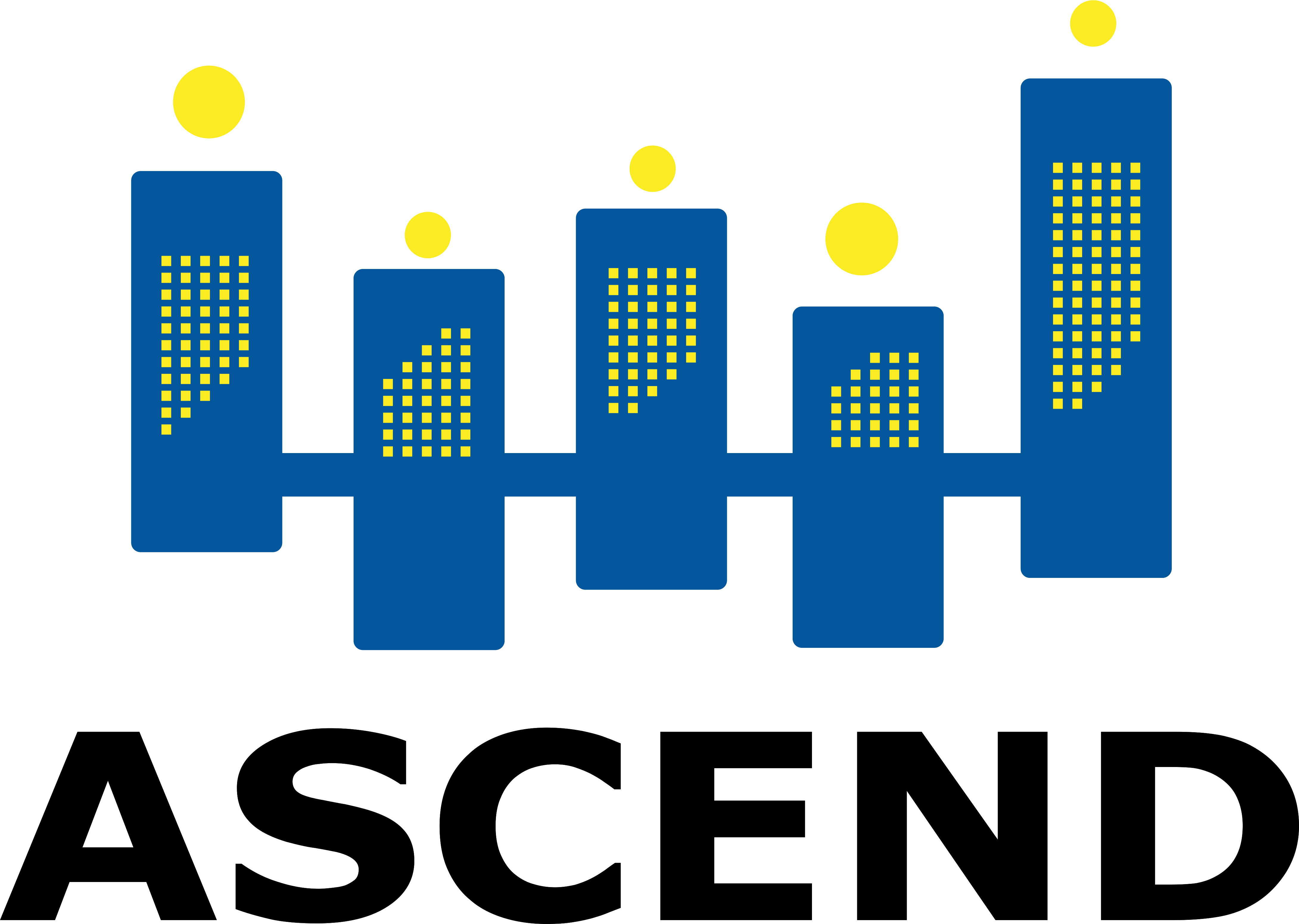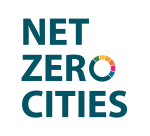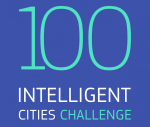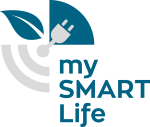ASCEND encourages active collaboration with existing Smart Cities and Communities projects under the Horizon 2020 program. The aim is to leverage their expertise, learn from their experiences, and foster the exchange of best practices.
The collaboration between project partners facilitates the exchange of knowledge within. This collaboration consists of various activities, including active participation in meetings, joint event organization, engagement in conferences, and involvement in task groups focused on communication, dissemination, and replication.
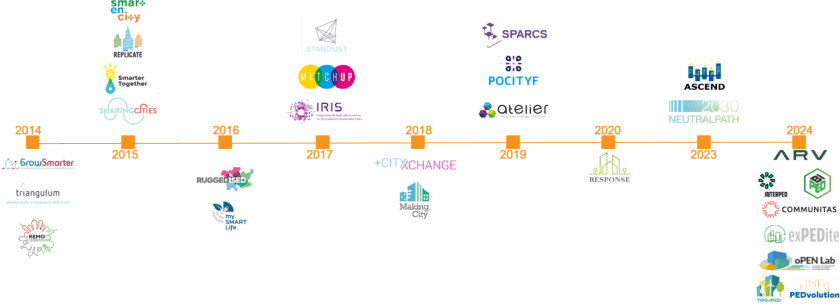
Cities ecosystem
Scalable Cities
Scalable Cities plays a pivotal role in identifying and advocating for energy solutions and business models that have the potential to be expanded and replicated throughout Europe. It represents a network of 120 cities engaged in 18 Smart Cities and Communities projects funded by Horizon 2020. Collaborating with academia, industry partners, associations, and consultants, Scalable Cities implements over 550 demonstrations of technological and social innovations. These initiatives encompass various domains, including mobility and logistics, buildings, urban data and ICT infrastructure, citizen engagement, and urban governance.
Smart Cities Marketplace
The Smart Cities Marketplace is a major market-changing enterprise supported by the European Commission. It brings together cities, industries, SMEs, investors, researchers and other smart city actors. The Marketplace offers insight into European smart city good practice, allowing you to explore which approach might fit your smart city project. It also represents a community of experts that can help you in shaping your smart city project so that you get your plan and business case ready for financing and presenting to investors.
NetZeroCities
NetZeroCities has been designed to help cities overcome the current structural, institutional and cultural barriers they face in order to achieve climate neutrality by 2030.
The project works as a service-oriented platform supported by world-class practitioners. It helps European cities by providing them with the support and solutions they need to achieve climate neutrality in a socially inclusive way.
New European Bauhaus
The New European Bauhaus brings innovation, ambition and creativity together. It calls on all Europeans to imagine and build a sustainable and inclusive future that is beautiful for our eyes, minds, and souls.
The New European Bauhaus brings citizens, experts, businesses, and institutions together to reimagine sustainable living in Europe and beyond. In addition to creating a platform for experimentation and connection, the initiative supports positive change also by providing access to EU funding for beautiful, sustainable, and inclusive projects.
Intelligent Cities Challenge
A European Commission initiative supporting European cities towards the green and digital transition of their local economies, through Local Green Deals. ICC helps European cities harness the power of cutting-edge technologies, while improving their economic competitiveness, social resilience and their citizens' quality of life.
Driving Urban Transitions
Through research, innovation, and capacity building, they enable local authorities and municipalities, service and infrastructure providers, and citizens to translate global strategies into local action.
They develop the skills and tools to make urban change happen and boost the urgently needed urban transformations towards a sustainable future with enhanced quality of life in cities
Urban Innovative Actions
Provides urban areas throughout Europe with resources to test new and unproven solutions to address urban challenges.
The main objective of UIA is to provide urban areas throughout Europe with resources to test innovative solutions to the main urban challenges, and see how these work in practice and respond to the complexity of real life.
CIVITAS
Since its launch in 2002, CIVITAS has advanced research and innovation in sustainable urban mobility and enabled local authorities to develop, test and roll out measures via a range of projects. A series of ten thematic areas underpin these.
CIVITAS supports cities to make smart and sustainable urban mobility a reality for all. In doing so, it is ensuring that mobility is a driving force behind the creation of climate-neutral and resilient cities.
Covenant of Mayors
The EU Covenant of Mayors for Climate & Energy is an initiative supported by the European Commission, bringing together thousands of local governments that want to secure a better future for their citizens. By joining the initiative, they voluntarily commit to implementing EU climate and energy objectives.
European City Facility
The EUCF unlocks this potential to and support municipalities, local authorities, their groupings and local public entities aggregating municipalities/local authorities in Europe with tailor-made, fast and simplified financial support (in the form of EUR 60,000 lump sums) and related services. This enables them to develop relevant investment concepts related to the implementation of actions identified in their climate and energy action plans.
C40 Cities
C40 is a global network of nearly 100 mayors of the world’s leading cities that are united in action to confront the climate crisis.
Mayors of C40 cities are committed to using an inclusive, science-based and collaborative approach to cut their fair share of emissions in half by 2030, help the world limit global heating in line with the Paris Agreement, and build healthy, equitable and resilient communities.
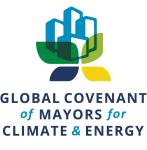
Global Covenant of Mayors
GCoM is the largest global alliance for city climate leadership, built upon the commitment of over 13,500 cities and local governments.
The Global Covenant of Mayors for Climate & Energy builds upon the commitment of thousands of cities and local governments, which stand ready to partner with national and international institutions to tackle the climate crisis through local initiatives, innovative financing models, citizens' engagement and sustainable infrastructure.
Project community
NEUTRALPATH
NEUTRALPATH aims to support cities in their transition to climate neutrality by designing a collaborative plan for a more sustainable future for all.
RESPONSE
Funded by the European Commission’s Horizon 2020 Framework Programme, RESPONSE aims to establish a strategic vision for Smart Cities Energy Transition: Climate-neutral cities by 2050. RESPONSE aims to turn energy sustainability into a do-able vision by solving the energy trilemma (security, equity/affordability, environmental sustainability) at building, block and district levels in smart cities.
POCITYF
Involving cities with heritage sites in Europe’s renewable energy transition is the mission of the EU-funded smart city project POCITYF. POCITYF will demonstrate innovative smart city technologies in two Lighthouse Cities, Alkmaar (NL) and Evora (PT), and replicate them in 6 Fellow Cities. POCITYF combines Positive Energy Blocks with grid flexibility, e-mobility, innovative ICT technologies and citizen engagement strategies, while respecting the urban cultural heritage.
ATELIER
ATELIER is an Amsterdam and Bilbao citizen-driven smart cities project funded by the European Commission. Coordinated by the City of Amsterdam, the project combines the expertise and the commitment of 30 partners from 11 countries. ATELIER focuses on developing citizen-driven Positive Energy Districts in the two Lighthouse Cities, Amsterdam (NL) and Bilbao (ES). Their successful implementations will then be replicated and tested for feasibility in six Fellow Cities.
GREEN DEAL ARV
The ARV project aims to demonstrate and validate attractive, resilient, and affordable solutions that significantly speed up deep energy renovations in four different climatic zones in Europe and the deployment of energy and climate measures in the construction and energy industries.
ARV will provide guidelines and a policy framework for future energy-efficient, circular, and digital solutions in the construction industry.
INTERPED
InterPED aims to enable the concept of PEDs via sector coupling, cross-vector integration, demand flexibility and consumer engagement, while improving utilisation of local RES, storage and excess/waste heat sources.
Optimised PED operations will be demonstrated at pilot sites, while enabling a cooperative demand response strategy at the community/district level.
BI-PED
Aims to enhance Positive Energy Districts (PEDs) by developing Local Digital Twins (LDTs) that integrate social, cultural, and political data, enabling comprehensive urban modeling and data-driven decision-making for sustainable city planning with a testbed in Aarhus.
COMMUNITAS
COMMUNITAS principal goal is to pave the way for the empowerment and engagement of different types of consumers and prosumers, placing them at the heart of energy markets. It will do so by boosting the creation and exploiting the potentialities of ECs as hubs for innovative energy services, integrated with non-energy benefits, co-created together with citizens and other stakeholders.
exPEDite
ExPEDite aims at creating and deploying a novel digital twin, allowing for real-time monitoring, visualisation and management of district-level energy flows.
The project will culminate in the publication of practical guidelines, reusable models, algorithms, and training materials to aid other cities in replicating the digital twin for their districts, fostering widespread adoption of sustainable energy practices.
OPENLAB
oPEN Lab is an EU-funded project leading the transition to Positive Energy Neighbourhoods in Tartu (Estonia), Pamplona (Spain) and Genk (Belgium).
PEDvolution
PEDvolution paves the way for cross-sectoral integration of ever-evolving Positive Energy Districts. European pioneers in PED conceptualisation, implementation and tool development will materialise this through the co-development and implementation of interoperable solutions.
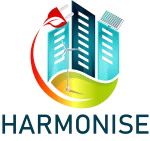
HARMONISE
HARMONISE is committed to developing an end-to-end solution for transforming districts into Positive Energy Districts (PEDs). Our project focuses on creating scalable, interoperable, and user-centered solutions to enhance energy management and integrate renewable resources.
Mission: To drive the transition towards smart, green cities by implementing hierarchical and agile energy management systems that optimize resource utilization and promote sustainability.
Key Objectives
- End-to-End Solution: Deliver a comprehensive system for managing and integrating PEDs with a focus on scalability and replicability.
- User Engagement: Develop tools and applications that support stakeholder involvement and active business models.
- Innovation: Leverage advanced technologies like fog computing and blockchain for secure and efficient energy management.
TIPS4PED
TIPS4PED or Turning cIties Planning (into) actionS for Positive Energy Districts, involving four cities from four countries, which will investigate scalable and easily reproducible technologies and digital optimisation strategies for the successful delivery of Positive Energy Districts in European cities.
Completed SCC Projects
+CityxChange
Within the +CityxChange (Positive City ExChange) project, the cities of Trondheim (NO), Limerick (IE), Alba Iulia (RO), Písek (CZ), Sestao (ES), Smolyan (BG) and Võru (EE) are experimenting on how to become leading cities integrating smart positive energy solutions. Using digital services, quality of life will be improved for and with the involvement of citizens, more energy will be produced than consumed, and experiences exchanged with cities across Europe, to learn faster together.
MAKING-CITY
Coordinated by the CARTIF Foundation, MAKING-CITY is a 60-month Horizon 2020 project launched in 2018. It aims to address and demonstrate the urban energy system transformation towards smart and low-carbon cities, based on the Positive Energy District (PED) concept. The PED concept will be tested and validated in 2 Lighthouse cities: Groningen (NL) and Oulu (FI). It will be then replicated in 6 Follower cities: Bassano del Grappa (IT), Kadıköy (TU), León (ES), Lublin (PL), Trenčín (SK) and Vidin (BG).
SPARCs
The EU-funded SPARCs project encourages the participation of blocks of buildings and districts in the energy market, aiming to turn urban areas into energy prosumers. SPARCs engages 31 partners from 9 EU countries and coordinates a wide range of stakeholders from citizens and local planning authorities to companies and research institutions for the transformation of cities to carbon-free inclusive communities.
STARDUST
STARDUST is an EU Horizon 2020 Smart Cities project that brings together advanced European cities to form a constellation of ‘innovation islands’ that act as exemplary models of smart, highly efficient, intelligent and citizen-oriented cities. Technical green solutions and innovative non-technical solutions are being implemented and validated, enabling them to be bankable and replicable by other cities. STARDUST will show the way for cities to achieve a more sustainable path by interweaving innovation and imagination.
MAtchUP
MAtchUP is an EU-funded Smart City project involving three lighthouse cities and four follower cities. MAtchUP cities are joining forces to reshape their social, economic and environmental models and to promote social inclusion, liveability and prosperity for their citizens. MAtchUP is designing and implementing a palette of innovative solutions in the energy, mobility and ICT sectors that will serve as a model of urban transformation for other cities in Europe and beyond.
IRIS
IRIS is a Horizon 2020 project that is being developed around three lighthouse cities – Utrecht (NL), Nice (FR), and Gothenburg (SE). These cities are working as collaborators and test-beds for follower cities – Vaasa (FI), Alexandroupolis (GR), Santa Cruz de Tenerife (ES) and Focsani (RO). Each city will draw upon a mix of universities and research organisations, local authorities, innovation agencies and private expertise to accelerate entire communities to adopt ambitious energy, mobility and ICT initiatives.
RUGGEDISED
RUGGEDISED was a smart city project funded under the European Union’s Horizon 2020 research and innovation programme. It brought together three lighthouse cities: Rotterdam (NL), Glasgow (UK) and Umeå (SE) and three follower cities: Brno (CZ), Gdansk (PL) and Parma (IT) to test, implement and accelerate the smart city model across Europe.
mySMARTLife
mySMARTLife was a project funded under the European Union’s Horizon 2020 research and innovation programme. Under the coordination of CARTIF Technology Centre, 27 partners from 6 countries collaborated to make sustainable cities with smart people and a smart economy a reality. Activities took place in the three demonstration cities Nantes (FR), Hamburg (DE) and Helsinki (FI). The three follower cities Bydgoszcz (PL), Rijeka (HR) and Palencia (ES) learned from these experiences.
SmartEnCity
SmartEnCity, coordinated by TECNALIA Research Innovation, brought together 35 partners from six countries to make Smart Zero Carbon Cities a reality in Europe. The underlying Smart Zero Carbon City concept involves keeping a city’s carbon footprint and energy demand to a minimum by using demand-controlled technologies that save energy and raise awareness. This approach was initially defined in detail, planned and implemented in the Lighthouse demonstrator cities: Vitoria-Gasteiz (ES),Tartu (ET) and Sonderborg (DK).
REPLICATE
REPLICATE: REnaissance of PLaces with Innovative Citizenship And TEchnologies was a European research and development project that aimed to deploy integrated energy, mobility and ICT solutions in city districts. There were 3 lead cities – San Sebastian (ES), Florence (IT) and Bristol (UK), in addition to ‘follower’ cities that looked into replicating – Essen (DE), Nilüfer (TU) and Lausanne (CH), and ‘observer’ cities – Guangzhou (CN) and Bogota (CO), as well as international networks that took part in learning and dissemination of results. The Consortium consisted of 38 partners
SMARTER TOGETHER
The European lighthouse cities Vienna (AT), Munich (DE) and Lyon (FR), the follower cities Santiago de Compostela (ES), Sofia (BG) and Venice (IT), the observer cities Kiev (UA) and Yokohama (JP) came together to improve citizens quality of life. SMARTER TOGETHER prepared the ground for large-scale replication and ensured an in-depth knowledge transfer about the setting up of smart city business models and user-centric innovation in order to contribute to positive societal dynamics.
Sharing Cities
The Sharing Cities ‘lighthouse’ programme was a proving ground for a better, common approach to making smart cities a reality. By fostering international collaboration between industry and cities, the project developed affordable, integrated, commercial-scale smart city solutions with a high market potential. Sharing Cities offered a framework for citizen engagement and collaboration at local level, thereby strengthening trust between cities and citizens. The project aimed to engage over 100 municipalities across Europe.
GrowSmarter
In a rapidly urbanising world cities need to become smarter to respond to citizen needs and to reduce their environmental footprint. GrowSmarter brought together cities and industry to integrate and demonstrate ’12 smart city solutions’ in energy, infrastructure and transport, to provide other cities with valuable insights on how they work in practice and opportunities for replication. The idea was to create a ready market for these smart solutions to support growth and the transition to a smart, sustainable Europe.
Triangulum
The three-point project Triangulum demonstrated, disseminated and replicated solutions and frameworks for Europe’s future smart cities. The Lighthouse Cities Manchester (UK), Eindhoven (NL) and Stavanger (NO) served as testbeds for innovative projects focusing on sustainable mobility, energy, ICT and business opportunities. The project consortium consisting of 22 partners worked together to develop and implement smart solutions in order to replicate them in the three follower cities.
REMOURBAN
REMOURBAN developed and tested a sustainable urban development model that combined the energy, mobility and ICT sectors to improve efficiency and reduce greenhouse gas emissions in the cities of Valladolid (ES), Nottingham (UK) and Tepebasi (TU).
